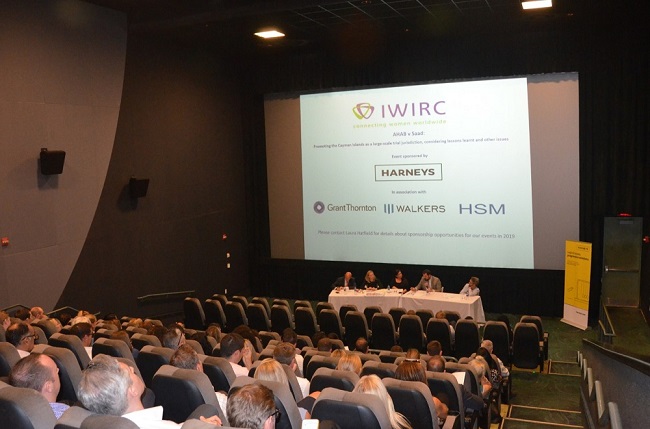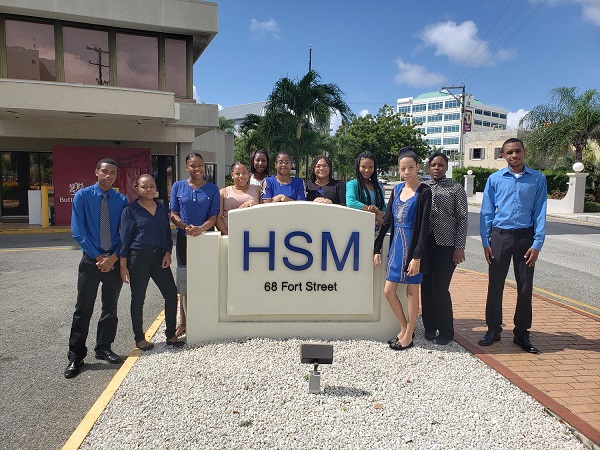Tag Archives: HSM Cayman
Both the same, right? Under the Immigration Law of the Cayman Islands, seemingly not. Unexpected twists and pitfalls await the unwary.
Through decades of tweaking we now find ourselves in a position whereby there are (by our estimation) eight types of Permanent Residence in these Islands (not including The Right to be Caymanian which carries with it many of the fundamental attributes of Permanent Residence, or the various persons granted permission to remain by the Cabinet).
First is that which has been headline-grabbing in recent years, Permanent Residence on the basis of the now (in)famous points system.
Then there is that available to the spouses of such persons (as a Dependant).
Then there is that available to the spouses of Permanent Residents who have applied, on the basis of marriage, for their own Residency and Employment Rights Certificate on the basis of Marriage.
Then there is that available to the children of Permanent Residents following their reaching the age of 18.
Then there is that available to wealthy investors.
Then there is that available to their spouses.
Then (since 13 August 2018) there is that available to the spouses of Caymanians.
The above are all available in consequence of applications made to Workforce, Opportunities and Residence Cayman (“WORC”) under the Immigration (Transition) Law. Each has differing attributes and requirements. Some require annual fees and Annual Declarations, others do not. Some require investment in real estate (and for it to be maintained), others do not. Some restrict the right to work, others prohibit it, and others do not.
Notwithstanding complications and occasional confusion arising from the sheer variety available, the system fundamentally works. Those holding the various types of Permanent Residence outlined above do have one thing in common. They are all able to present their passports to the Immigration Authorities and to receive within it a stamp confirming that the holder of the passport is a Permanent Resident of the Cayman Islands (with or without the Right to Work).
Lastly, there is Permanent Residence available to persons who are Registered as BOTC’s by Registration by Entitlement under the British Nationality Act. Registration by Entitlement is in consequence an application made to the Deputy Governor’s Office that can be made by (or on behalf of) any child who was born in the Cayman Islands and remains a resident until their 10th birthday. These applications do not arise under Cayman Islands domestic legislation. There is no basis to deny such an application, if made by a qualified applicant. There is no need for either parent of the child to be Caymanian, a Permanent Resident, or a BOTC. Simple birth and residence here for the first 10 years of an applicant’s life (together with completing a form, supplying supporting documents, and paying relatively nominal fees) is all that is required.
Our Immigration (Transition) Law (like the Immigration Law before it) clearly confirms that these children have “the Right to remain Permanently in the Islands.” Nevertheless, any attempt by them to obtain a stamp in their passport confirming their right to remain has in our experience been refused. The Authorities contend that the Right to Remain and the Right to Reside are different things. This has been the case for some years and no solution seems imminent. Meanwhile the number of children eligible for confirmation of their “Right to Remain” immigration status in their passports continues to grow.
Those studying our laws governing residence and immigration will note that (appropriately, if they are to have its desired effect of allowing the People of the Cayman Islands to manage the growth of the Permanent Population of these Islands) Term Limits are set at 9 years. Nevertheless, due to numerous loopholes and delays there is no shortage of children who were born here and are still here on their 10th birthday. Their right to Permanent Residence (however described) is appropriate and enshrined within our own Law.
If only they could be given a stamp in their passport, then they could confirm their status in these Islands and freely demonstrate it.
This article can also be seen in The Journal – March 2019 issue.
The HSM Group congratulates Partner William (Bill) Helfrecht for his recognition by Chambers and Partners. For the second consecutive year, William is featured in the Band 3 ranking in the 2019 Chambers Global Guide for dispute resolution: trusts in the Cayman Islands.
William’s practice primarily focuses on advising and acting for liquidators, professional trustees, trust protectors and high net-worth individuals in relation to non-contentious and contentious trust matters, professional negligence and other tort actions, Company Law matters (including directors’ liability and shareholders’ rights) and all forms of disputes concerning the ownership and occupation of land.
A peer who was contacted by Chambers and Partners says: “Bill Helfrecht of HSM Chambers is a highly appreciated practitioner whose practice has a particular focus on trust disputes. He garners respect in the market for his wealth of experience in this field.”
Chambers and Partners is a prestigious hub for lawyer recommendations. They diligently research and feature the world’s best lawyers and have done so since 1990, covering over 185 jurisdictions.
Key Contact:

William Helfrecht – Partner
whelfrecht@hsmoffice.com
Tel: +1 345 815 7418
HSM’s Immigration team explores the immigration issues that exist in the Cayman Islands between Caymanians and British Overseas Territory (BOT) Citizens.
Passports seem to have originated as a document authorising persons to pass through “the gate” of a medieval city. Times have moved on and (at least according to Wikipedia) passports today are a “travel document usually issued by a country’s government that certifies the identity and nationality of its holder primarily for the purpose of international travel.”
Great in principle, but not accurate in the Cayman context.
Cayman Islands passports are neither issued by the Cayman Islands government, nor do they (usually) confirm the nationality of the holder. They are travel documents certifying the identity of the holder and are used for international travel. Everyone lawfully issued a “Cayman Islands Passport” is a British Overseas Territories Citizen by virtue of a connection with the Cayman Islands.
They may or may not however be Caymanian, and unless the immigration authorities place a stamp in it confirming the bearer to be a Caymanian, the passport itself is not determinative of whether or not the holder is Caymanian. Even persons who hold Cayman Islands passports and were born and have always lived in the Cayman Islands may not be Caymanian.
Even more confusingly, many British Overseas Territories Citizens by virtue of a connection with the Cayman Islands have no inherent right to live and work in (or even enter) the Cayman Islands, even if they have been British Overseas Territories Citizens (automatically) from birth. These will include children born in the Cayman Islands today to parents who hold Permanent Residence (whether or not they are also themselves British Overseas Territories Citizens).
According to the Cayman Islands Immigration Law, the only time a British Overseas Territories Citizen has any inherent right to live in the Cayman Islands by virtue only of their passport is if they became a British Overseas Territories Citizen by registration by entitlement under the British Nationality Act.
Such persons are persons who were born without British Overseas Territories Citizenship in the Islands and, having lived here for the first 10 years of their life, then apply for such registration or, if born in the Islands, have a parent who subsequently becomes settled. Even then, if they work without a work permit, or move away for five years, their right to reside is lost.
Non-Caymanians who are born British Overseas Territories Citizens (i.e. can hold Cayman Islands Passports without having to apply for Registration by Entitlement under the British Nationality Act) have no inherent right to reside or work in the Cayman Islands.
All of this creates an enormous conundrum for all manner of Departments of the Cayman Islands Government. There does not appear to be any uniform or consistently applied mechanism for distinguishing Caymanians from non-Caymanians and (particularly since having a Cayman Islands Passport and being born in the Cayman Islands are often irrelevant considerations to the question of whether or not someone is qualified to (for example) register to vote or obtain a stamp duty waiver as a first time buyer), the risk of arbitrary (and incorrect) determinations is significant.
The Immigration Regulations provide that the holders of Cayman Islands Passports need not fill in landing cards. It is ironic that Caymanians not travelling on a Cayman Islands Passport (many Caymanians do not have one, and some may not even be entitled to obtain one) have to complete landing cards whilst hundreds (or even thousands) of non-Caymanians with Cayman Islands Passports are exempt.
A Gordian Blade is available to the authorities to resolve this longstanding issue through minor changes to the Immigration regime. All that seems required is the will to wield it.
This article can also be seen in The Journal – February 2019 issue.
Several charities in the Cayman Islands have received secondhand office furniture provided by local law firm HSM.
The Family Resource Centre recently moved to a new location in George Town and were thrilled to receive a full desk set complete with joining desks, a filing cabinet and bookshelf.
One Dog at a Time collected two large filing cabinets, which volunteer Paula Wythe says is ideal for storing away pet products such as shampoos, brushes, medications and more.
The Frances Bodden Children’s Home selected a large desk for their facility in West Bay.
This is not the first time HSM has donated office furniture. A few years ago, HSM donated desks to Her Majesty’s Northward Prison for their F-wing, an enhanced living space for selected inmates.
“We are always looking for opportunities to support our community and what better way to start the New Year than helping these charities improve their daily operations,” shares HSM Managing Partner, Huw Moses OBE.
HSM still has desks, cabinets, keyboards, blinds and commercial UPS switches available to a worthy home. Email Alyson Hay at ahay@hsmoffice.com to register your charity for these items.
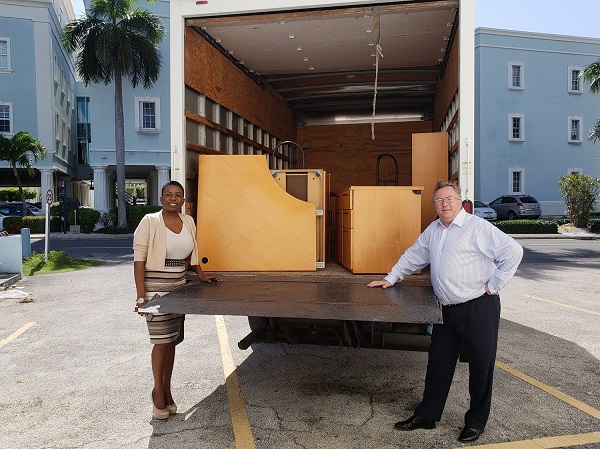
Photo R-L: Huw Moses (HSM Managing Partner) overseas the departure of this furniture set to Racquel Duhaney (Programme Facilitator at the Family Resource Centre).
Corey Neysmith and Gabriel Morla of HSM IP Ltd. presented International Trademark Association’s (INTA) Unreal Campaign to over 40 students at the Cayman Islands Further Education Centre (CIFEC) on Thursday, 29 November 2018.
INTA’s Unreal Campaign is a consumer awareness programme aimed at educating teenagers about the importance of trade marks, intellectual property and the dangers of counterfeit products.
Corey, a Senior IP Assistant, started the presentation by explaining the role and importance of registering a trade mark. Corey explains, “A trade mark can be a word, design, service mark and can even be the shape of a building. If a company doesn’t register their distinct features, then a competitor can rightfully take ownership of their ideas and with it, their customer base.”
Since 1 August 2017, it has become possible to register a trade mark in the Cayman Islands without having to go through the United Kingdom or European Union first, thanks to the implementation of The Trade Marks Law, 2016.
Gabriel, an IP Assistant and past CIFEC student, delivered the second part of the presentation which focused on counterfeiting. Gabriel shares, “We stressed the economic impact created when people purchase knockoffs. Counterfeits not only pose a threat to your health and safety, but they directly hurt businesses in the form of job losses and their reputation.”
The students then enjoyed a game of “spot a fake”, where they had to guess between two similar looking products and identify the reasons as to why one of them was the fake. Afterwards, there was a lively discussion for Q&A.
This is the fourth time that HSM IP has presented to students in the Cayman Islands as part of the Unreal Campaign initiative and encourages all consumers to be vigilant when shopping.
Studies show that counterfeiting is rising at an alarming rate. It is estimated that by 2022, the global total value of counterfeit goods could reach US $2.8 trillion, according to a 2017 impact study, The Economic Impacts of Counterfeiting and Piracy, released by Frontier Economics and commissioned by INTA and the International Chamber of Commerce’s Business Action to Stop Counterfeiting and Piracy.
“It is rewarding for our team to be able to share their expertise with our local community and to bring awareness of the negative impacts caused by purchasing counterfeit products,” shares HSM IP Managing Partner, Huw Moses. “Consumers of all ages need to be alert to the risks of purchasing counterfeits, which may expose them not just to financial loss but physical harm.”
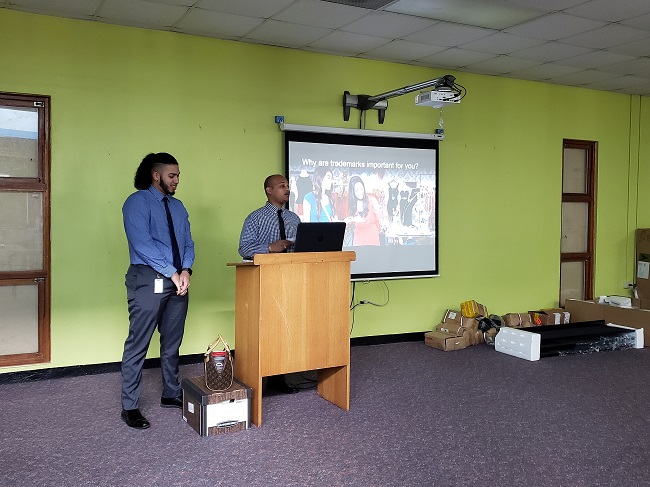
Gabriel Morla (left) and Corey Neysmith (right) Share the Importance of Trade Marks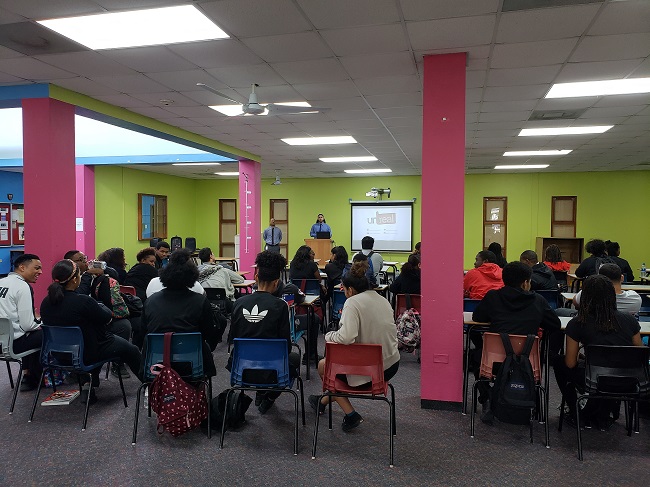
HSM Partner Ian Lambert promotes the Cayman Islands as a large-scale trial jurisdiction with International Women’s Insolvency & Restructuring Confederation (IWIRC) Cayman.
On November 26, Ian participated in a panel discussion on lessons learned and other issues for Cayman’s longest and most expensive case, AHAB v Saad.
Panelists also included Shelley White (Walkers), Hugh Dickson (Grant Thornton), Grainne King (Harneys) and William Peake (Harneys).
Their lively discussion and recount of this case showcased how the Cayman Islands’ legal framework is able to handle complex litigation and insolvency matters.
Our Head of Private Client and Trusts, Robert Mack, takes a look at Foundation Companies in the Cayman Islands and how they differ to trusts in the private client context.
In late 2017, Foundation Companies in the Cayman Islands were unveiled to the world. The Foundation Company (“FC”) was designed to act as a corporate wealth and succession planning vehicle; in some cases, it could be a viable alternative to a trust.
There are also new and unexpected uses for FCs, such as acting as a platform for emerging cryptocurrencies and special purpose vehicles in commercial transactions.
The first thing to understand about FCs is that they are merely a variant of a Cayman Islands company and are distinct in nature from civil law foundations found in places such as Panama, Lichtenstein, and certain offshore financial centers such as Jersey. FCs also have a separate legal personality, directors, officers, plus a registered office. So what sets them apart from other Cayman Islands companies? A few key distinctions are as follows:
- FCs are not designed to distribute profits to members, but rather they are meant to carry out particular purposes in accordance with its constitution. In the trust-substitute context, a key purpose is usually to hold valuable assets in order to provide a financial benefit to a defined class of beneficiaries;
- FCs do not have to issue shares, and can, therefore, be ownerless or ‘orphan’ vehicles;
- The purposes of an FC can be entrenched, so no person or court can alter them unless the founder of the FC permits it.
It is also important to understand just how FCs differ from trusts:
- Trusts do not have a separate legal personality. The term ‘trust’ merely describes the relationship which arises when assets/property are held by one person (i.e., a trustee) for the benefit of other persons or purposes (i.e., beneficial objects);
- Trustees are the legal owners of the trust assets;
- The terms of a trust can, in certain circumstances, be changed without the consent or approval of the settlor;
- Unless a Cayman Islands trust is a private purpose or charitable trust, it has a maximum duration of 150 years; FC’s, on the other hand, are perpetual;
- The courts of the Cayman Islands have broader scope to interfere in the administration of trusts than FCs.
Perhaps the biggest ‘leap of faith’ any person wishing to set up a trust must face is the fact that once they part with their valuable assets, it is the trustee who becomes the legal owner of those assets and it is the trustee who makes all the decisions about the management of those assets going forward[1]. This loss of control, while often beneficial from a planning perspective, is often a step too far for some clients, even though it is possible for a settlor of a Cayman Islands trust to reserve to himself or others, certain key administrative powers such as a power to control distributions of capital and income[2].
On the other hand, FCs allow a client to achieve effective control over the FC assets, whether directly (i.e., by taking up a role as a director or officer of the FC), or indirectly (i.e., by appointing trusted individuals as directors or officers of the FC).
While the vast majority of settlors will appoint a professional trustee to administer their trusts[3], an FC may be staffed by the client, family members, or trusted advisors[4]. This could result in minimising administrative expenses if professional directors and officers are not involved[5]. In contrast, for example, private purpose trusts (known as STAR trusts in the Cayman Islands) require that at least one of the trustees is a regulated Cayman Islands trust corporation, and such professional trustee will look to charge market rate for their services.
Foundation Companies in the Cayman Islands offers clients a new and exciting way for clients to structure their affairs with a more familiar corporate entity, and in addition the FC enables clients to be as hand-on or hands-off on the administration of the FC as they wish to be without the risk of tainting the structure[6]. For the client wary of trusts, the FC is an excellent alternative and worthy of consideration.
Cayman Financial Review
This article can also be seen in Cayman Financial Review – Q4 2018 issue.
Footnotes
[1] Subject to the terms of the trust instrument and the law generally. It is possible in some circumstances for a client to act as the trustee of his or her own trust, however, that is often inadvisable for a whole range of reasons which are outside of the scope of this article.
[2] Often times it is impractical or inadvisable for a Settlor to reserve such powers as it may have an adverse tax consequence in his or her place of tax residence.
[3] Due to the complexity of trust administration, tax efficiency, and Cayman Islands legislation which prescribe that professional trustees must appointed for certain types of trusts (ie. STAR trusts).
[4] The only requirement is that the Secretary of an FC must be a ‘qualified person’ being a person who is licensed to provide company management services in the Cayman Islands.
[5] An annual government maintenance fee of approximately US$853 is payable for each year the FC is registered however. Trusts to not attract any such annual fees.
[6] If too many trustee powers are usurped, or if the trustee/settlor relationship becomes corrupted there is a risk the trust may be deemed to be a ‘sham trust’.
HSM’s Immigration team explores The Immigration (Amendment) Law, 2018 (“the Amendment Law”) that came into effect on 13 August 2018, and following this passage, new opportunities present themselves for persons who are married to a Caymanian and hold (or are seeking) Residency and Employment Rights Certificates as the spouse of a Caymanian.
According to documentation recently received from the Department of Immigration there are approximately 350 expatriates holding Residency and Employment Rights Certificates (RERC’s) as the spouse of a Caymanian. We expect this number will increase.
Unlike the RERC’s awarded to Permanent Residents, the RERC’s awarded to the spouse of a Caymanian were not previously permanent in nature. They only lasted for 7 years and the holder either had to seek the Right to be Caymanian (on the basis of 7 years’ marriage to a Caymanian) or seek to renew their RERC prior to its expiry.
Until the spouse of a Caymanian became Caymanian, they could not be said to be free from any immigration restriction on the period they are permitted to remain in the Islands given the 7 year period of validity of their RERC. This meant that they were unable to be naturalised or obtain a Cayman Islands passport during that 7 year period.
Cayman Islands Passports are only available to persons who hold British Overseas Territories Citizenship (“BOTC”) by virtue of a connection with the Cayman Islands. The process for being, or becoming, a BOTC of the Cayman Islands is set out in and governed by the British Nationality Act. That Act has at all relevant times required applicants for Naturalisation to have been resident in the Territory for a minimum of twelve months’ “free from Immigration Restriction for the period for which they may remain” prior to becoming eligible to apply for Naturalisation.
In contrast, the spouse of a Permanent Resident was able to seek Naturalisation a year after marrying a PR holding expatriate, and thereafter obtain a Cayman Passport. The result was that a spouse of a Caymanian was until very recently with the passing of the Amendment Law treated far less favourably. They would have to be married to a Caymanian for 7 years’, apply for Caymanian status on the grounds of 7 years’ marriage, obtain that status, and hold it for 12 months’ before being eligible to apply for naturalisation and thereafter, a Cayman Passport.
The Government has acted to ensure that a spouse of a Caymanian is subject to the same rules when seeking naturalisation and a Cayman Passport as the expatriate spouse of an expatriate PR holder. This change is welcomed and the authorities should be congratulated for making it.
The relevant amendment which came into effect on 13 August, has removed the 7 year expiry date on every RERC issued to a spouse of a Caymanian, in effect making their RERC Certificate indefinite in nature.
With no expiry date to their Certificate, a spouse of a Caymanian holding an RERC may now, provided they have held an RERC for no less than 12 months’ and have been legally and ordinarily resident in Cayman for no less than 5 years’, apply for Naturalisation on the Grounds of Residence. If they are married to a Caymanian, who is also a BOTC by virtue of a connection to the Cayman Islands and have been married and resident for 3 years’, an application for Naturalisation on the Grounds of Marriage to a BOTC can now be made.
This will greatly expedite the ability of a spouse of a Caymanian to seek and obtain Cayman Islands Passports and further, for them to thereafter seek registration as full British Citizens which, if granted, would enable them to hold full British Citizenship in addition to being British Overseas Territories Citizens.
Once the spouse of a Caymanian has been naturalised as a BOTC, they will be eligible to seek to become Caymanian on the basis of Residence some 5 years’ later or 15 years’ after first becoming Resident in the Cayman Islands, whichever is less. This is the mechanism by which most long term residents may become
Caymanian and is entirely consistent with the original intention of what started as the Caymanian Protection Law, that in order to be eligible to become Caymanian, applicants must first be British Subjects.
The ability of a spouse of a Caymanian to seek to become Caymanian relying on 7 years’ of marriage to a Caymanian (rather than on the basis of Naturalisation/Residence set out above) continues; although not least given issues that may arise following any breakdown of the marriage, prospective applicants for Caymanian Status may prefer (all other considerations being equal) to follow the Naturalisation/Residence route to becoming Caymanian rather than seeking status based on marriage.
Holders of RERC’s as a spouse of a Caymanian continue to enjoy unfettered access to the labour market and to be free to engage in any category of gainful occupation without having to pay annual fees.
The Government has elected to not require a spouse of a Caymanian to undertake any annual reporting requirements but given perceptions as to marriages of convenience and the potential for such spouses to be living apart, such provisions may need to be introduced in the future.
This article can also be seen in The Journal – November 2018 issue.
The Cayman Islands is recognised as one of the most prestigious flag states internationally and is a popular and attractive base for the registration of foreign owned vessels.
The Cayman Islands, consisting of Grand Cayman, Cayman Brac and Little Cayman, are a British overseas territory located in the western Caribbean Sea. Cayman is a major world offshore centre, which, in conjunction with its comprehensive maritime legislation, allows flexibility and safety for vessel owners in a tax neutral environment.
Cayman is a category 1 British Registry, affording Cayman registered vessels all the privileges that accompany the British Flag, along with full international recognition.
Additionally, a wide range of ownership structures is available to facilitate flagging a vessel in Cayman, and it is not always necessary for a Cayman Islands flagged vessel to be owned by a Cayman Islands individual or entity. Moreover, there are few restrictions on crew nationality for Cayman flagged vessels.
A full range of vessel registration options are offered by the Cayman Islands Shipping Registry (from bareboat charters to full registration).
HSM advises on all aspects of the vessel registration process in the Cayman Islands and maintains excellent relationships with the Cayman Islands Shipping Registry and is listed as a maritime services provider/partner.
For more details on our vessel registration services, visit hsmoffice.com/law/vessel-registration.
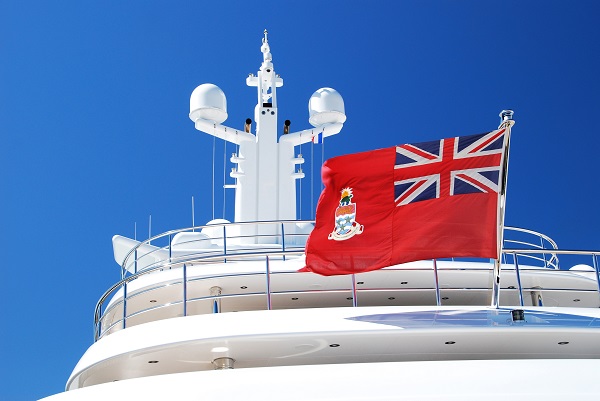
The HSM Group is excited to once again offer a legal internship for the 2018/19 academic year in partnership with the Cayman Islands Further Education Centre (CIFEC). This year marks their largest group with 16 placements.
The students were recruited at the CIFEC Career Fair which took place in September 2018. As part of the CIFEC curriculum, each student attends work twice a week during school hours.
HSM’s internship programme begins October 2018 and runs until April 2019. The students have been paired with a mentor and will gain experience in areas such as immigration, corporate services, debt collection, intellectual property and even areas outside of law, such as finance and marketing.
Joining the team are: Kymani Rose, Jada Dixon, Iesha McIntosh, Paula Brown, Oneila Ewers, Shante Ramoon, Jordyn Thompson, Amelia Lamie, Abigail Campbell, Shaquana Welcome, Chadrick Thomas, Shantel Miller, Yanina Montero, Nia Carter, Izarah Brown and Chelsea Frederick.
Upon completion of this programme, some students may have the opportunity to return to HSM for a summer placement during normal office hours. If a student has proven a match for an open position with the company, they may be offered a fulltime job. HSM currently employs six CIFEC graduates fulltime.
“We are passionate about sharing our expertise to Cayman’s next generation of leaders and are proud to be able to offer more opportunities this year,” shares HSM Managing Partner, Huw Moses OBE. “It is inspiring for us to watch these students learn and grow professionally.”
HSM has worked with the CIFEC progamme since their inception in 2012. The firm’s continued involvement in the CIFEC internship showcases their unwavering commitment to the local community by providing work experience opportunities to ambitious young professionals.
Fatal error: Uncaught Error: Call to undefined function twentythirteen_paging_nav() in /home/clients/d17af2243e6f179e393695ba6e9ce04e/hsmnew/wp-content/themes/hsm/tag.php:33 Stack trace: #0 /home/clients/d17af2243e6f179e393695ba6e9ce04e/hsmnew/wp-includes/template-loader.php(78): include() #1 /home/clients/d17af2243e6f179e393695ba6e9ce04e/hsmnew/wp-blog-header.php(19): require_once('/home/clients/d...') #2 /home/clients/d17af2243e6f179e393695ba6e9ce04e/hsmnew/index.php(17): require('/home/clients/d...') #3 {main} thrown in /home/clients/d17af2243e6f179e393695ba6e9ce04e/hsmnew/wp-content/themes/hsm/tag.php on line 33
